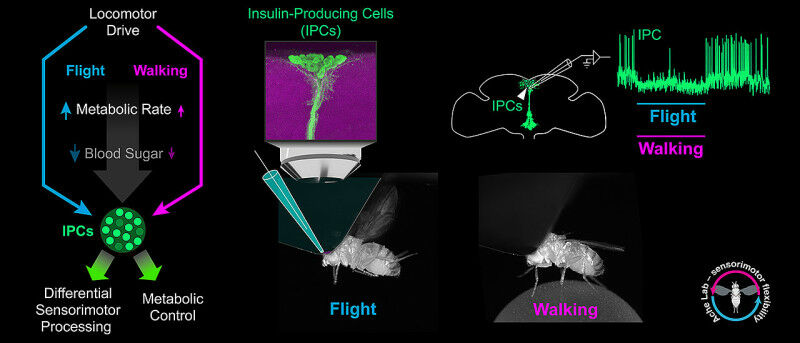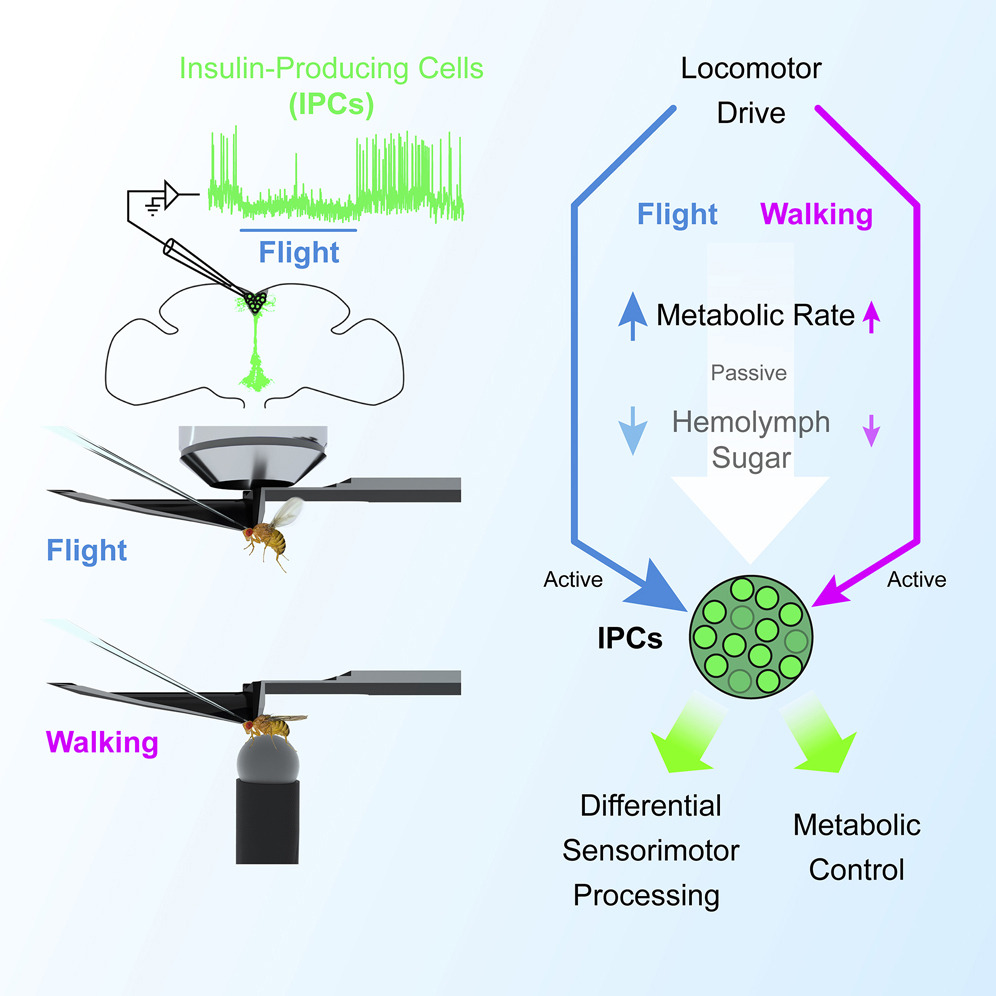博文
运动抑制胰岛素的产生
||
运动抑制胰岛素的产生
诸平
据德国巴伐利亚维尔茨堡大学(University of Würzburg / Julius-Maximilians-Universität (JMU) Würzburg in Bavaria, Germany)2023年1月4日报道,运动抑制胰岛素的产生(Exercise Curbs Insulin Production)。上图显示了果蝇中产生胰岛素的细胞的运动和调节之间的关系。当果蝇开始行走或飞行时,其产生胰岛素的细胞会立即受到抑制。这可能是为什么运动促进健康的一种解释。
胰岛素是人类和许多其他生物的必需激素。它最著名的任务是调节糖代谢。它如何完成这项工作是众所周知的。关于胰岛素产生细胞的活性以及胰岛素的分泌是如何被控制的,人们知之甚少。
来自德国巴伐利亚维尔茨堡朱利叶斯-迈克希米利安大学(Julius-Maximilians-Universität简称JMU) 生物中心(Biocenter of JMU Würzburg in Bavaria, Germany)的一个团队,于2022年12月28日已在科学期刊《现代生物学》(Current Biology)杂志网站上发布了关于这个问题的相关研究结果——Sander Liessem, Martina Held, Rituja S. Bisen, Hannah Haberkern, Haluk Lacin, Till Bockemühl,Jan M. Ache. Behavioural state-dependent modulation of insulin-producing cells in Drosophila. Current Biology, Published online 28 December 2022, DOI: 10.1016/j.cub.2022.12.005. https://doi.org/10.1016/j.cub.2022.12.005
扬·阿彻(Jan M. Ache)博士的小组使用果蝇 Drosophila melanogaster作为他们的研究对象。有趣的是,这种果蝇在进食后也会分泌胰岛素。然而,在果蝇中,这种激素不像人类那样来自胰腺,而是由大脑中的神经细胞释放。
活跃果蝇的电生理测量(Electrophysiological measurements in active flies)
JMU小组发现,果蝇的体力活动对其产生胰岛素的细胞有很强的影响。研究人员首次通过电生理测量了这些细胞在行走和飞行的果蝇中的活动。
结果:当果蝇开始行走或飞行时,其产生胰岛素的细胞立即受到抑制。当果蝇停止移动时,细胞的活性会再次迅速增加并飙升至正常水平以上。
上述论文的第一作者桑德尔·利塞姆(Sander Liessem)博士说:“我们假设在行走和飞行过程中产生胰岛素的细胞的低活性有助于提供糖以满足增加的能量需求。我们怀疑运动后增加的活动有助于补充果蝇的能量储存,例如在肌肉中。”
血糖没有调节作用(Blood sugar plays no role in regulation)
JMU团队还能够证明,对产生胰岛素的细胞的快速、行为依赖性抑制是由神经通路主动控制的。“它在很大程度上与果蝇血液中糖浓度的变化无关,”合著者玛蒂娜·黑尔德(Martina Held)博士解释道。
对于生物体来说,以这种方式预测能量需求的增加以防止血糖水平的极端波动是很有意义的。
胰岛素在进化过程中几乎没有改变(Insulin has hardly changed in evolution)
结果是否允许得出关于人类的结论?很可能。
“虽然果蝇体内胰岛素的释放是由与人类不同的细胞介导的,但胰岛素分子及其功能在进化过程中几乎没有改变,”扬·阿彻说。在过去的20年里,使用果蝇作为模式生物,许多基本问题已经得到解答,这些问题也有助于更好地了解人类的代谢缺陷和相关疾病,例如糖尿病或肥胖症。
更少的胰岛素意味着长寿(Less insulin means longevity)
桑德尔·利塞姆告诉我们:“一个令人兴奋的观点是,胰岛素活性降低有助于健康衰老和长寿。” 这已经在苍蝇、老鼠、人类和其它物种身上得到证实。这同样适用于积极的生活方式。“我们的工作显示了一个可能的联系,可以解释身体活动如何通过神经元信号通路对胰岛素调节产生积极影响。”
更进一步的研究(Further steps in the research)
接下来,扬·阿彻的团队计划研究哪些神经递质和神经元回路导致在果蝇中观察到的胰岛素生成细胞的活性变化。这可能具有挑战性:大量的信使物质和激素参与神经调节过程,并且单个物质组合起来可能具有相反或互补的作用。
该小组现在正在分析产生胰岛素的细胞处理来自外部输入的多种方式。他们还在研究可能影响这些细胞活性的其它因素,例如果蝇的年龄或它们的营养状况。
“与此同时,我们正在研究行走和飞行行为的神经元控制,”扬•阿彻解释说。他说,他的团队的长期目标是将这两个研究问题结合起来:大脑如何控制步行和其它行为,以及神经系统如何确保相应地调节能量平衡?
上述介绍,仅供参考。欲了解更多信息,敬请注意浏览原文或者相关报道。
• Insulin-producing cells (IPCs) are strongly and rapidly modulated by locomotion
• IPC activity is inhibited during and overshoots after cessation of locomotion
• IPC modulation is predictive of metabolic demands at behavioral transitions
• IPC inhibition is actively driven by feedforward neuronal pathways
Insulin signaling plays a pivotal role in metabolic control and aging, and insulin accordingly is a key factor in several human diseases. Despite this importance, the in vivo activity dynamics of insulin-producing cells (IPCs) are poorly understood. Here, we characterized the effects of locomotion on the activity of IPCs in Drosophila. Using in vivo electrophysiology and calcium imaging, we found that IPCs were strongly inhibited during walking and flight and that their activity rebounded and overshot after cessation of locomotion. Moreover, IPC activity changed rapidly during behavioral transitions, revealing that IPCs are modulated on fast timescales in behaving animals. Optogenetic activation of locomotor networks ex vivo, in the absence of actual locomotion or changes in hemolymph sugar levels, was sufficient to inhibit IPCs. This demonstrates that the behavioral state-dependent inhibition of IPCs is actively controlled by neuronal pathways and is independent of changes in glucose concentration. By contrast, the overshoot in IPC activity after locomotion was absent ex vivo and after starvation, indicating that it was not purely driven by feedforward signals but additionally required feedback derived from changes in hemolymph sugar concentration. We hypothesize that IPC inhibition during locomotion supports mobilization of fuel stores during metabolically demanding behaviors, while the rebound in IPC activity after locomotion contributes to replenishing muscle glycogen stores. In addition, the rapid dynamics of IPC modulation support a potential role of insulin in the state-dependent modulation of sensorimotor processing.
https://blog.sciencenet.cn/blog-212210-1370613.html
上一篇:带有氯气的电极提供了高功率和能量密度
下一篇:酷酷的制冷新方法

